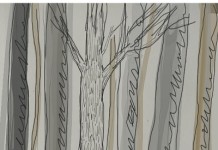You’d have to have been living under not only a rock, but something of a whole tectonic plate, n ot to have heard at least some discussion of the imminent global climate crisis. Typically, this discussion manifests in dreary news broadcast segments about rapidly vanishing shorelines, or op-eds about the latest art-defilement-slash-eco-protest fiasco at a local museum, or, at the worst of times, heated social media rants, complete with firestorm comment sections. And while these efforts do serve their purposes, in that they bring to the forefront of the collective consciousness (with varying success rates) the titanic gravity of the climate issue, they’ve begun to overwhelm the average citizen. It’s not uncommon to see lip service paid to these sorts of warnings (just read some of the feedback in those comment sections!) – and this might distress the big-picture types out there who would simply wish to sound the proverbial alarm before it’s too late. It would appear that, for ecological activists and concerned citizens alike, a different strategy is needed, and, as Rishi Dastidar proves with Neptune’s Projects, that strategy may very well lie in humour.
Dastidar’s collection can be broken down into four primary segments. It begins with the ruminations of a despondent, neutered Poseidon – one whose best days are seemingly behind him. This water god does not want our sympathy, though. He instead wishes to take us on a voyage of sorts, past those receding shores (“Trade volumes”), along lovers’ beaches, (“Inhale the sea”) up to highwater marks (“Kelpie”), and down to the ocean’s nadir (“Shipwreck champagne”), so that he might show us our civilizational failings. Many enemies lie in wait. Hyperobjects – to which the book’s poems, suggests the subtitle, serve as ballads – loom large in the distance and the foreground.
An abundance of ecological and mythological allusions present themselves during this first leg of the journey. Some stare you straight in the face. Others hide pleasantly below the surface. With a great deal of consideration being given to the dire state of our seas and environment, the tone quickly verges on despairing in poems like “Monodies for the Anthropocene”:
the last tide they – we – will
be able to dodge; inevitable gurgling predictability
replaced by a static, choking confusion –
still ponds kill less romantically than waves do.
or “Top of the food chain”:
and yet you did nothing: sound various
alarms, change damn all. I’m glad: as if
you had some divine lease to stay on
the planet forever. Species come, go,
get over yourselves. I bet the dinosaurs
didn’t want to disappear into kids’ TV either.
Yet this portion is where Dastidar does some of his best work, carefully tempering this heaviness with much-welcomed humour. Imagery of Neptune choking on a vortex of ducks, for example (“Feeling aquamarine”), is as pathetic as it is hilarious, and equally funny is his utter ordeal of a visit to an art gallery in “Neptune’s concrete crash helmet” (isn’t this approach so much better than throwing soup on a Van Gogh?) The stylistic curveballs of poems like “New planet who dis?” offer comedy in a frenetic, playful mode that breaks up the pervading sense of environmental and social collapse.
The collection takes a bit of a detour in its second section, “Pretanic,” to move to the more limited scope of the British political. Dastidar uses these pieces to explore strong themes of anti-imperialism, in ways both related and unrelated to environmental conservation. The more fruitful of these poems, such as “Tight Little Island,” spell these themes out with impressive metaphorical expansiveness, and sometimes feature clever bits of ocean-related imagery, which helps maintain a cohesive whole. However, pieces like “Impossible nation” and “Eating popcorn at the apocalypse” eschew this kind of nuance in place of one-note humour that, while still funny, comes off less like new-age mythologizing and more like the poet’s personal condemnations of Britain’s history. Still, the deliciously absurd ending stanza of this section’s “Overblown Age” largely makes up for any haiku kitschiness or seen-it-before wisecracks:
that tries to fill infinity but there is nothing
more invigorating than firehose drinking
while the fifth horseman slowly flattens
his horse into a burger for a delivery.
For the third act, we’re whisked along to the “Crisis or War Comes” component, which introduces a humanistic optimism that’s appreciated at this juncture. One of the marks of great purposeful or edifying gallows humour is its ability to first apprise the reader of everything that’s wrong, make them feel true despair or discomfort, and then offer a glimmer of hope or something actionable. Here, Dastidar does just that by shifting toward a terse, didactic delivery. He borrows content from the English version of a Swedish brochure on wartime preparations (bit of a mouthful), with the idea of guiding readers through a quasi-resistance, should they need to survive after the apocalypse. Poems like “Your emergency preparedness,” “In the event of terror,” and “Home tips” have just enough poetic vigour to resist lapsing back into the mere instructional scripts they come from. There may be irony at first, but second and third readings reveal a thoughtful continuity in subject matter and formatting meant to deliver us from a place of fear to a place of enfranchisement. Consequently, it’s only fitting for the first poem of the section to consider calamities such as “extreme weather and IT attacks,” and the final poem of the section (“protective spaces”) to end on the comforting, antidotal lines:
you are needed
[…]
important numbers
collected in one place
Equipped with (or deluded by) a fresh sense of agency, we’re ultimately taken by way of a barque, later, a dhow, to the collection’s finale. Neptune’s witty, laconic voice resurfaces. We’re made to ponder the apocalypse and the Novacene. But the real star of the show is the concluding poem, “Neptune Clough.” Dastidar brings together all the main threads of the collection by having Neptune replace a football club manager and attempt to reform the team. The piece only spans one page, but it sees Neptune motivate his players with “candlestick[s] of gin” and finally regain some of his former glory when his team wins. It’s a heartfelt moment for Neptune, as we see this downtrodden figure given back just a little of the power he’s been stripped of. As well, the reader gets to share in this experience of catharsis, having shadowed Neptune throughout the book. It feels like a win for both.
With Neptune’s Projects, Rishi Dastidar has a vision – a grand Anthropocenic journey – and there’s much to see along the way: Lorelei, sonic booms, Modern Britain (in all its ignominy), doomsday preparations, CT scans, open-air bars, networks of plankton, clapping sea lions, WhatsApp convos with Gaia, triumphant ice bucket celebrations. Dastidar knows how to keep things fresh and relatable while communicating an important message of impending climate disaster. To this end, the references he makes throughout, be they to Alexander von Humbolt, or Salammbô, or Towering Inferno, are thoughtful enough to add depth and charm without feeling forced. As well, the stylistic variety of the poems throughout keeps things engaging. Dastidar’s most impressive accomplishments in the book stem from his mastery of the comedic timing and structuring (there are numerous clever callbacks), but also from those moments when he charts new linguistic territory. Little gems of imagery, like “rocks of demerara sugar” (“Le Plongeoir”) and “bloodhounds chasing complexity’s fox” (“The Brexit Book of the Dead”), elevate the collection and show that there’s more to Neptune’s Projects than just comedy and a crucial moral.
If there’s one small thing the reader might find themselves wanting for, it’s specific villains. Dastidar takes aim at many groups along the way – oil companies, news networks, Friday robots, crammers. But which oil companies? Which AI robots? Hell, which crammers? No poet wants a defamation lawsuit on their hands, surely, but there are so many first-rate offenders out there – many of whom have been mysteriously let off on their own criminal charges (cough BP cough) – that there’s next to no risk in calling just a few out. This would perhaps jeopardize some of the levity that Dastidar rightly pursues with this collection, but movements are born not of general scapegoating but of directed conscientiousness, let’s call it. Through his anthropomorphic Neptune, Dastidar, in fact, makes it known that everyone is the issue, which, by default, includes the concerned citizens and activists out there working to change these circumstances. I couldn’t help but just a touch deflated at this, even if I was entertained in the process of such deflation.
All told, Neptune’s Projects is plucky. It’s resonant. It’s waggish. It’s sting-your-tongue effervescent. But most of all, it’s bold, urgent reading for a global population in crisis. Well done, Rishi Dastidar.
An easier form, if this reads a little clunkily:
“You’d have to been living under a rock — or, perhaps, a whole tectonic plate — not to have heard…”


























